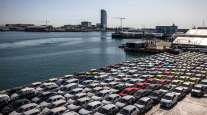Rising Protectionism Risks Undermining Trade Rebound, WTO Says

Global trade could rebound this year — if rising protectionism and tighter economic policy stay out of the way.
Trade is likely to grow by 2.4% this year, according to the World Trade Organization, up from 1.3% in 2016. The revival is forecast to be driven by continuing economic expansion in many countries, though measures to curtail trade, higher interest rates and tighter fiscal policies could all undermine growth, WTO said in a report published April 12.
RELATED: Trump’s trade ‘hammer’ aims to pound China, Mexico and the WTO
While the global economic recovery is continuing, protectionist sentiment has been on the rise as many voters express anger over being left behind. President Donald Trump has pledged to renegotiate U.S. trade deals including the North American Free Trade Agreement, and the U.K. is preparing to exit the European Union, the world’s biggest free-trading area.
Central banks, meanwhile, are facing the dilemma of possibly needing to raise interest rates to address rising inflation while output remains lackluster.
All this risks damping trade and the world economy by extension, according to WTO. Governments should address economic issues at home by improving education, training and social programs to help the jobless compete for work, rather than reining in trade, it said.
RELATED: Trump's trade concerns? WTO head says organization can handle it
“Trade has the potential to strengthen global growth if the movement of goods and supply of services across borders remains largely unfettered,” said Roberto Azevedo, director-general of the WTO. “However, if policymakers attempt to address job losses at home with severe restrictions on imports, trade cannot help boost growth and may even constitute a drag on the recovery.”
Policy uncertainty is the biggest risk, WTO said. If anti-trade measures materialize global trade growth could be closer to 1.8%, the lower end of its forecast range, than 3.6%, the top end.
Many of Trump’s promises on trade remain muddy. In recent weeks, White House officials have said that both Mexico and the U.S. stand to benefit from a renegotiation of NAFTA. That’s a change in rhetoric since January, when Trump tweeted that he’ll slap heavy taxes on businesses that move jobs to Mexico — a proposition that would risk violating WTO principles.
Britain’s future trading relationship with the European Union also remains unclear. Chancellor of the Exchequer Philip Hammond said earlier this month that some in the government don’t want a deal, a scenario that would expose British companies to WTO tariffs following decades of duty-free trade. European leaders have so far rejected Prime Minister Theresa May’s ambition of discussing a trade deal before reaching an agreement on the size of Britain’s exit fee.



